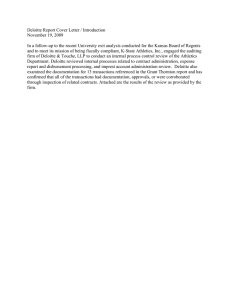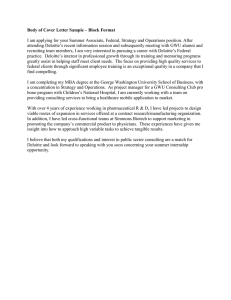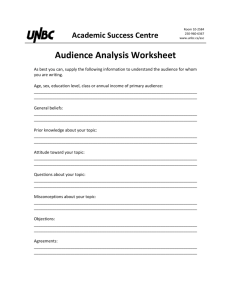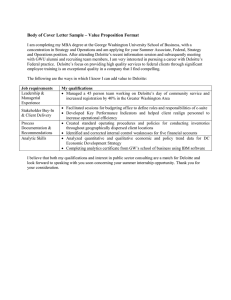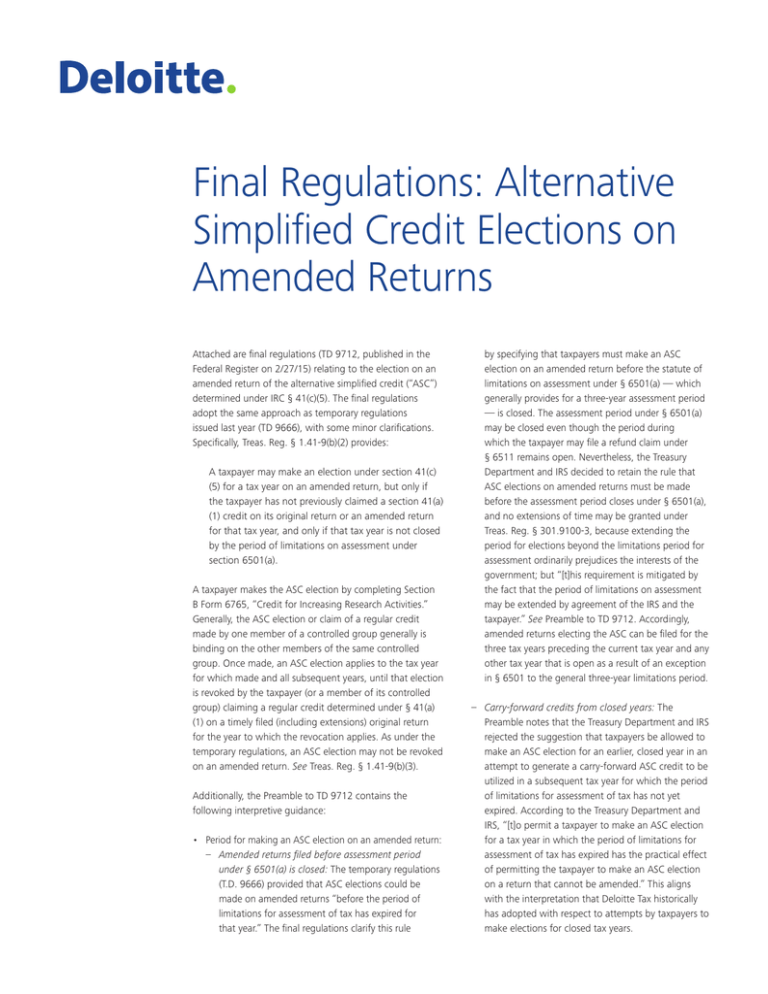
Final Regulations: Alternative
Simplified Credit Elections on
Amended Returns
Attached are final regulations (TD 9712, published in the
Federal Register on 2/27/15) relating to the election on an
amended return of the alternative simplified credit (“ASC”)
determined under IRC § 41(c)(5). The final regulations
adopt the same approach as temporary regulations
issued last year (TD 9666), with some minor clarifications.
Specifically, Treas. Reg. § 1.41-9(b)(2) provides:
A taxpayer may make an election under section 41(c)
(5) for a tax year on an amended return, but only if
the taxpayer has not previously claimed a section 41(a)
(1) credit on its original return or an amended return
for that tax year, and only if that tax year is not closed
by the period of limitations on assessment under
section 6501(a).
A taxpayer makes the ASC election by completing Section
B Form 6765, “Credit for Increasing Research Activities.”
Generally, the ASC election or claim of a regular credit
made by one member of a controlled group generally is
binding on the other members of the same controlled
group. Once made, an ASC election applies to the tax year
for which made and all subsequent years, until that election
is revoked by the taxpayer (or a member of its controlled
group) claiming a regular credit determined under § 41(a)
(1) on a timely filed (including extensions) original return
for the year to which the revocation applies. As under the
temporary regulations, an ASC election may not be revoked
on an amended return. See Treas. Reg. § 1.41-9(b)(3).
Additionally, the Preamble to TD 9712 contains the
following interpretive guidance:
• Period for making an ASC election on an amended return:
–– Amended returns filed before assessment period
under § 6501(a) is closed: The temporary regulations
(T.D. 9666) provided that ASC elections could be
made on amended returns “before the period of
limitations for assessment of tax has expired for
that year.” The final regulations clarify this rule
by specifying that taxpayers must make an ASC
election on an amended return before the statute of
limitations on assessment under § 6501(a) — which
generally provides for a three-year assessment period
— is closed. The assessment period under § 6501(a)
may be closed even though the period during
which the taxpayer may file a refund claim under
§ 6511 remains open. Nevertheless, the Treasury
Department and IRS decided to retain the rule that
ASC elections on amended returns must be made
before the assessment period closes under § 6501(a),
and no extensions of time may be granted under
Treas. Reg. § 301.9100-3, because extending the
period for elections beyond the limitations period for
assessment ordinarily prejudices the interests of the
government; but “[t]his requirement is mitigated by
the fact that the period of limitations on assessment
may be extended by agreement of the IRS and the
taxpayer.” See Preamble to TD 9712. Accordingly,
amended returns electing the ASC can be filed for the
three tax years preceding the current tax year and any
other tax year that is open as a result of an exception
in § 6501 to the general three-year limitations period.
–– Carry-forward credits from closed years: The
Preamble notes that the Treasury Department and IRS
rejected the suggestion that taxpayers be allowed to
make an ASC election for an earlier, closed year in an
attempt to generate a carry-forward ASC credit to be
utilized in a subsequent tax year for which the period
of limitations for assessment of tax has not yet
expired. According to the Treasury Department and
IRS, “[t]o permit a taxpayer to make an ASC election
for a tax year in which the period of limitations for
assessment of tax has expired has the practical effect
of permitting the taxpayer to make an ASC election
on a return that cannot be amended.” This aligns
with the interpretation that Deloitte Tax historically
has adopted with respect to attempts by taxpayers to
make elections for closed tax years.
• Interaction with § 280C Elections: Statutory § 280C(c)(3)
provides that to avoid a cutback of deductions otherwise
allowed to account for a research credit claimed, a
taxpayer must elect a reduced credit (generally equal to
65% of the credit amount determined under § 41) on its
original timely filed return for the tax year at issue. In this
regard, Treas. Reg. § 1.280C-4 provides that the Form
6765 attached to the original return must clearly indicate
the taxpayer’s intent to make the reduced-credit election
under § 280C(c)(3), regardless of whether any research
credits are claimed by the taxpayer on its original return.
Thus, to effectuate an election under § 280C(c)(3),
taxpayers may simply check the reduced-credit box on
line 17 of the Form 6765 attached to their original return,
without deciding at that time whether to claim a regular
credit or ASC for the taxable year (i.e., the rest of the
Form 6765 is blank when filed with the original return).
This approach is supported by the Preamble to TD 9712,
which indicates: “A section 280C(c)(3) election on line 17
of Form 6765 made in a taxable year does not, in and of
itself, constitute a credit claim under section 41(a)(1), and
accordingly does not preclude a taxpayer from making
an ASC election on an amended return for that taxable
year.” Thus, an amended return could subsequently be
filed for that taxable year reporting an ASC in section B of
the attached Form 6765 and that would be considered a
valid election of the ASC for the taxable year at issue (as
long as the amended return is filed within the assessment
period under IRC § 6501(a)). On the other hand, the
language in the Preamble suggests that a taxpayer who
has merely checked the reduced-credit box on line 34
of a Form 6765 attached to its original return will be
deemed to have effectuated an election under § 280C(c)
(3)(C) for that tax year (the same as if the taxpayer had
merely checked the reduced-credit box on line 17), but
the taxpayer has not yet affirmatively claimed either
a regular credit or ASC for that year. Therefore, if the
taxpayer wants to actually claim an ASC for that year
(and it has not previously made an ASC election that
remains in effect from a prior year), it should file an
amended return reporting an ASC to “perfect” its ASC
election prior to the close of the statute of limitations on
assessment of tax for the year at issue.
If you have any questions or comments, please contact any one of the Partners, Principals, and Directors in the Research
& Development and Government Incentives Service Line:
Name
Title
Location
Email
Business Phone
Mick Kane
Service Line Leader,
Tax Partner
Chicago
mkane@deloitte.com
+1 312 486 9906
Steve Arkin
Tax Director
Washington D.C.
sarkin@deloitte.com
+1 202 879 4980
Mike Goldbas
Tax Principal
Hartford
mgoldbas@deloitte.com
+1 860 725 3028
Mike Osborn
Tax Director
Pittsburgh
miosborn@deloitte.com
+1 412 338 7895
Angela Abernethy
Tax Director
Pittsburgh
aabernethy@deloitte.com
+1 412 338 7667
Ryon Allen
Tax Partner
New York
ryallen@deloitte.com
+1 646 348 3034
Tori Boegh
Tax Director
Los Angeles
vboegh@deloitte.com
+1 213 593 3716
Bill Boulet
Tax Director
Denver
wboulet@deloitte.com
+1 720 264 4805
George Curran
Tax Director
Philadelphia
gcurran@deloitte.com
+1 215 246 2524
Sean Gogerty
Tax Partner
Parsippany
sgogerty@deloitte.com
+1 973 602 6560
Marty Karamon
Tax Principal
New York
mkaramon@deloitte.com
+1 212 436 6302
Stephanie LaBacz Arm
Tax Director
Los Angeles
slabacz@deloitte.com
+1 213 553 1752
David Lyness
Tax Director
San Jose
dalyness@deloitte.com
+1 408 704 4667
Valentina Novakovic
Tax Director
Houston
vnovakovic@deloitte.com
+1 713 982 4979
Eric Peterson
Tax Partner
Los Angeles
ericpeterson@deloitte.com
+1 213 553 1693
Laura Ray
Tax Partner
Chicago
laray@deloitte.com
+1 312 486 1807
2
About Deloitte
Deloitte refers to one or more of Deloitte Touche Tohmatsu Limited, a UK private company limited by
guarantee, and its network of member firms, each of which is a legally separate and independent entity.
Please see www.deloitte.com/about for a detailed description of the legal structure of Deloitte Touche
Tohmatsu Limited and its member firms. Please see www.deloitte.com/us/about for a detailed description of
the legal structure of Deloitte LLP and its subsidiaries. Certain services may not be available to attest clients
under the rules and regulations of public accounting.
Copyright © 2015 Deloitte Development LLC. All rights reserved.
Member of Deloitte Touche Tohmatsu Limited


